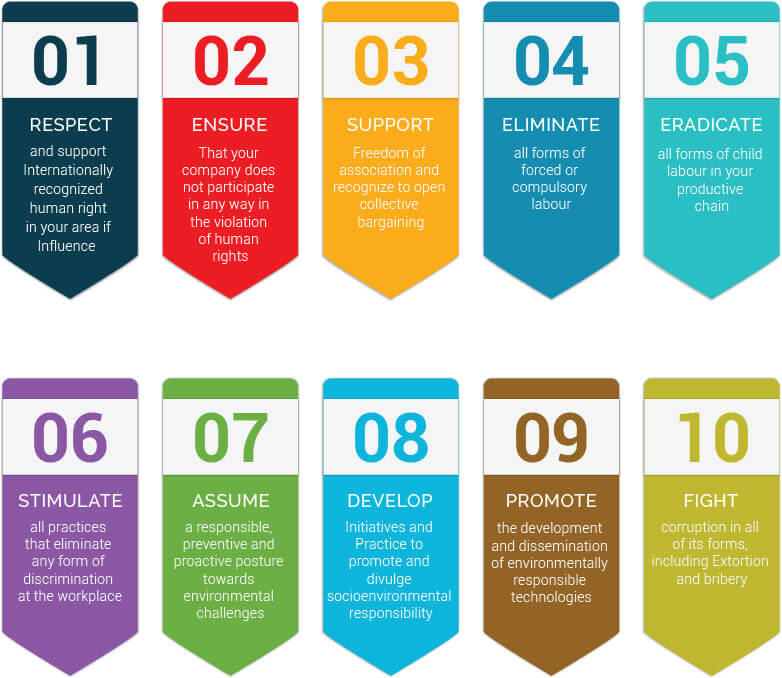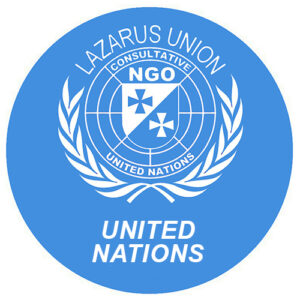UN GLOBAL COMPACT
The United Nations Global Compact is a voluntary initiative that encourages businesses worldwide to adopt sustainable and socially responsible policies and to report on their implementation. Its principles are derived from universal declarations and conventions and are aligned with the Sustainable Development Goals (SDGs) of the 2030 Agenda.

The importance of the UN Global Compact in improving the world of work and its linkage to the SDGs can be outlined as follows:
Importance of the UN Global Compact for Improving the World of Work
- Promotion of Labor Rights:
- The Global Compact includes principles directly related to labor, such as the elimination of forced and compulsory labor, the abolition of child labor, the promotion of gender equality, and the respect for the rights of workers to form and join trade unions. These principles help create fair, equitable, and safe working conditions globally.
- Corporate Social Responsibility:
- By committing to the Global Compact, companies demonstrate their commitment to corporate social responsibility. This commitment goes beyond profit-making and includes efforts to improve the well-being of employees, communities, and society at large.
- Enhancing Worker Well-being:
- The Global Compact encourages businesses to adopt policies that promote the health, safety, and well-being of workers. This can lead to more motivated, productive, and satisfied employees, which in turn can enhance overall business performance.
- Fostering Inclusive Workplaces:
- The principles promote diversity and inclusion in the workplace, helping to ensure that all employees, regardless of their background, have equal opportunities and are treated with respect and dignity.
- Encouraging Sustainable Practices:
- The Global Compact urges companies to operate sustainably, which includes responsible resource management and reducing environmental impact. Sustainable practices contribute to a healthier environment for workers and communities.

Linkage to the SDGs of the 2030 Agenda
The UN Global Compact is intrinsically linked to the Sustainable Development Goals, and its principles help to advance several specific SDGs:
- SDG 1: No Poverty
- By promoting fair wages, decent work conditions, and economic growth, the Global Compact helps to reduce poverty.
- SDG 3: Good Health and Well-being
- Ensuring healthy lives and promoting well-being for all at all ages is supported by the Global Compact’s principles related to workplace safety and health.
- SDG 5: Gender Equality
- The Global Compact advocates for gender equality in the workplace, supporting equal pay for equal work, and the elimination of gender-based discrimination.
- SDG 8: Decent Work and Economic Growth
- This goal is directly aligned with the Global Compact’s labor principles, emphasizing the importance of sustained, inclusive, and sustainable economic growth, full and productive employment, and decent work for all.
- SDG 10: Reduced Inequalities
- By promoting non-discrimination and equality in the workplace, the Global Compact contributes to reducing inequalities within and among countries.
- SDG 12: Responsible Consumption and Production
- Encouraging sustainable business practices ensures that companies are responsible in their production processes, which is a core principle of the Global Compact.
- SDG 16: Peace, Justice, and Strong Institutions
- The principles of anti-corruption and ethical business conduct promoted by the Global Compact contribute to peace, justice, and strong institutions.
- SDG 17: Partnerships for the Goals
- The Global Compact fosters partnerships between businesses, governments, and civil society, which are essential for achieving the SDGs.
Conclusion
The UN Global Compact plays a critical role in improving the world of work by encouraging businesses to adopt principles that promote human rights, fair labor practices, environmental sustainability, and anti-corruption measures. These principles are tightly interwoven with the SDGs, contributing to the broader goal of sustainable development. By aligning business operations and strategies with the SDGs, the Global Compact helps create a more equitable, inclusive, and sustainable world of work, which is essential for achieving the 2030 Agenda.



